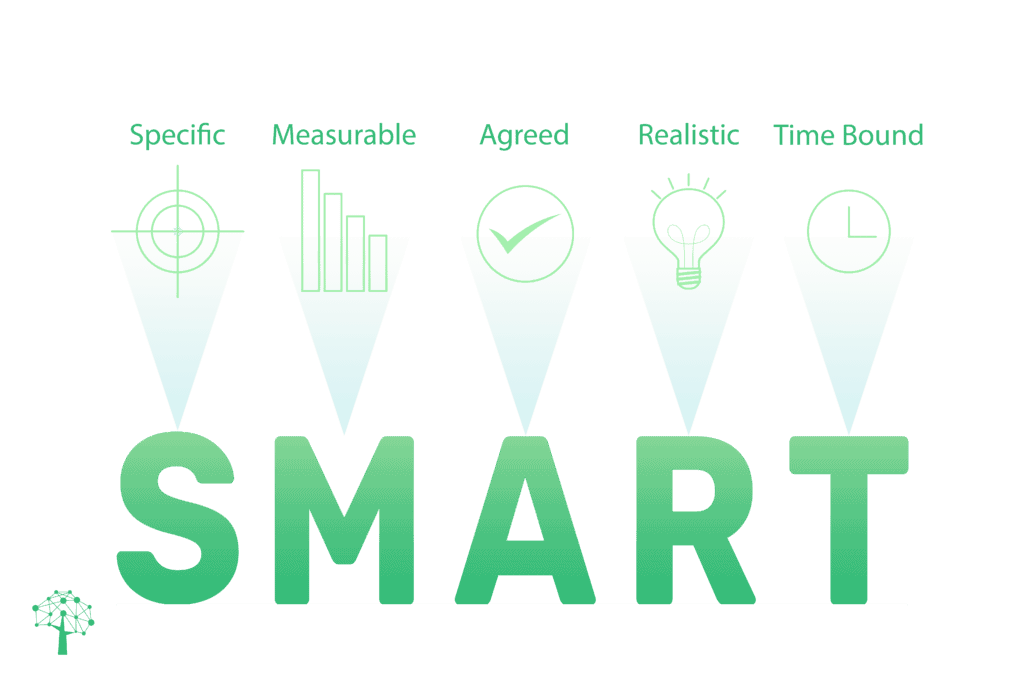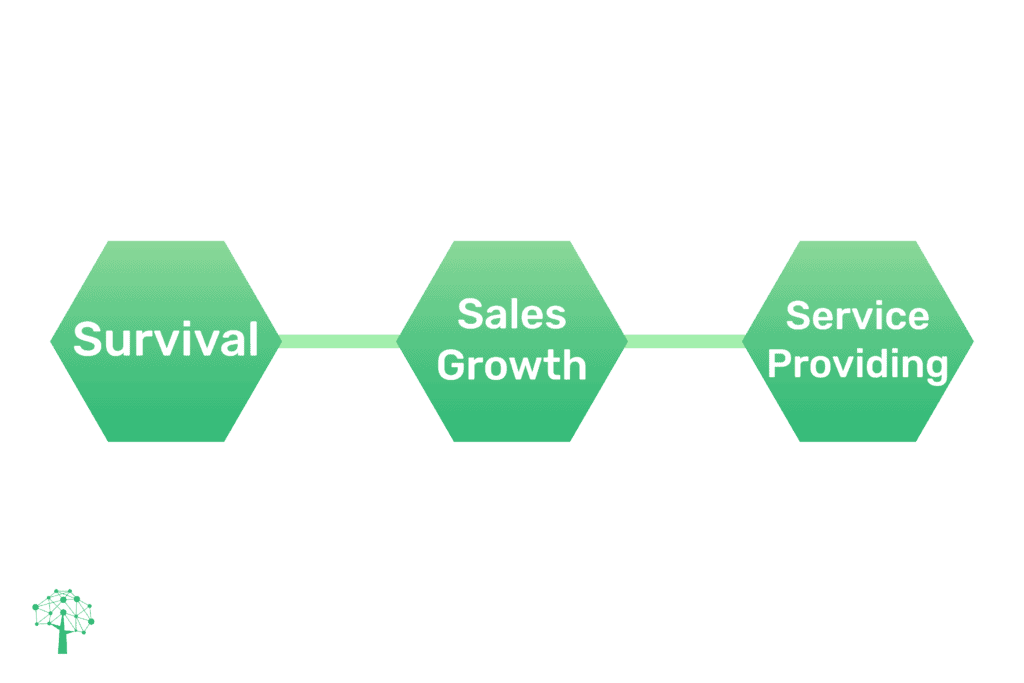Business Objectives and Goals: Defining the How -Definition and Purpose
As a general rule, planning and organization are critical for a business. Most of the causes which lead to the failure of any business related to lack of planning and organization. Setting business objectives is one of the basic keys of planning and organizing. Be it a project, a marketing strategy, or a yearly plan, business objectives are always invited to the party. This is an introduction to business objectives, why they matter and how can you define objectives for your business.
Mục Lục
Definition of Business Objectives
“A business objective is a detailed picture of a step you plan to take in order to achieve a stated aim.” Objectives and goals may be used interchangeably, however, they are not the same. Goals are the headlines; the final destination you would like your business to reach, whereas objectives define how the journey will be like.
Objectives are detailed and measurable steps that answer questions such as which transportation you will take, how long the journey will last, how much the ticket costs, etc.
Both concepts complete each other and they both build upon each other. In addition, business objectives and goals employ two different languages. Goals usually use emotional and creative language since they express dreams or final achievements. Meanwhile, objectives usually speak in terms of numbers, percentages, and deadlines; practical language.
Purpose
Business objectives explain the how to your business. They distinguish your business from any other one even if they both have the same niche. Moreover, business objectives set a map to your developmental processes; a road. Without knowing where you are going, you will have no direction and eventually get lost.
Your goals are the source for any new ideas that you would like to introduce to your business. In other words, if an idea contradicts with your goals, you will not take it into consideration. This is a good way to filter out irrelevant ideas as it provides your business with the “framework” where you build ideas within. Goals help your business have a focus. In the meantime, objectives give your goal a mean.
Communication
Communicating business objectives is essential to spreading awareness about your business. Business owners must always convey their objectives to their employees and to their customers as well. As a business owner, one of the most effective management approaches is to involve your employees in your vision.
Therefore, understanding the objectives and goals of the company motivates your employees, and makes them feel that they are a part of the mission. Business objectives, in particular, simultaneously, sharing your objectives and vision with your customers is a powerful tool to spread brand awareness.
Before your clients decide to use your service or buy your product, they need to know who you are and how do you reach your goals. Being clear about your objectives and goals to identify your entity and sets it apart from others. Being open about your objectives make your clients and employees trust you and become your enthusiasts.
SMART Objectives

So now we know what business objectives mean, and what their function is. Are there any specific conditions which they must fulfil? As a matter of fact, there are a number of keywords that objectives must match:
S. M. A. R. T
Specific: Specific refers to being thoroughly detailed. As mentioned before, objectives are not headlines. They are customized according to the nature of the business. For example, a restaurant may set an objective of filling eighty percent of its tables every night of December. Furthermore, specific means clear and easy to understand.
Measurable: Business objectives are quantifiable. They must include definite numbers and well-defined action plans. This makes it easier to execute these measures.
Agreed: All the responsible parties should be in agreement about the objectives.
Realistic: Objectives are challenging, yet attainable. Unrealistic objectives make your business lose credibility and will make it hard for your employees to keep up with your objectives.
Time Bound: That refers to setting a specific time frame to accomplish your objectives.
Examples of Business Objectives
Here are some common objectives that private and public sector businesses share:

Survival
This is a short term objective that is usually set during times of crisis or when a small business is just starting. The objective of “survival” resembles an emergency alarm that requires serious and quick measures with short deadlines.
Sales Growth
As a matter of fact, in the world of business, money is the end goal of almost all businesses. It does not come as a surprise that increasing the number of sales to the maximum is the objective of all companies, from start-ups to global businesses.
Service Providing
This objective is more relevant to public sector organizations. Public services, like transportation, for example, do not have profit as their main focus. Their main objective is to provide value and facilitate the lives of the citizens. Despite the fact that these organizations gain some money, they must put the quality of the service itself before profit.
What is the Purpose of Aims and Objectives in Business?
Like many people, you may be a little bit sceptical of the need to set objectives when starting a business. After all, aren’t the objectives of businesses pretty obvious? They want to make money, right? There is some truth to this, but it’s hardly the whole picture.
For one thing ‘make lots of money’ isn’t the most concrete goal in the world, is it?
Your overarching mission might be to make a bundle of cash, but this is only half the story. When you define goals and objectives for your business, what you’re really trying to do is create a roadmap to achieve profitability. In fact, profitability is rarely possible without a clear definition of goals and objectives.
Why Businesses Set Aims and Objectives
Essentially, businesses set aims and objectives to give a framework for achieving success, as well as a way to monitor their progress. Your key business objectives should act as a guide for all of your staff throughout their daily tasks.
This has a number of benefits, including:
- Improving motivation and employee ownership of projects,
- Giving a clear mission,
- Helping your company to identify new ways to meet your core objectives.
Now that you know what aims, goals and objectives are for, let’s think in a little bit more detail about how this influences your day to day operations.
What is the Difference Between Goals and Objectives in Business?
Business goals and objectives are not exactly the same thing. As such, let’s take a look at what distinguishes how you define business goals from how you define objectives.
This is actually pretty simple.
In short, your goals are your aspirations. They are what you’d like to achieve in a big picture sense. By contrast, objectives are a concrete set of deliverables to get you there.
Other Objectives
Ethical and Social Objectives
Some organizations and business entities look beyond profit. They aim to raise awareness towards a specific issue. Business owners usually set the tone for the type of issue the business is concerned with.
For example, some fashion houses aim to spread awareness about animal-friendly products; products that do not involve any cruelty towards animals during manufacture. Sometimes a business may choose empowering women or erasing illiteracy as their objective according to the nature of the business. Although these organizations are not charitable, they still select an ethical or a social objective which benefits their community, while making profits.
Charities and Voluntary Organizations
These non-profitable organizations do not care about profits, so their objectives are never financial. Their objectives usually target community development and providing accessible services to the less fortunate.
Additional Business Objectives
To achieve some of the larger scale business objectives it may be easier to set out smaller objectives such as goals. These could include objectives per month, staff objectives and also the likes of organisation and risk objectives.
Revenue, ROI and Cost Objectives

All of these objectives involve the cost of the business or organisation. They also affect one another. Revenue is the amount of money a business or organisation makes in a particular period. It does not include costs of anything else including production or staff costs.
These costs are deducted from the revenue, to make up the net income of the business. Return on Investment known as ROI is another cost. It should also be an objective set out by a business. This is calculated by including all costs and comparing them to the revenue made by a product or service. If a business fails to hit ROI business objectives/targets, it may find it difficult to stay afloat and survive in their market. Therefore this objective is very important.
Other cost objectives may include efficiency. Efficiently includes factors such as ‘How many of a particular product can one member of staff produce in a day?’ or ‘How many units of gas or electricity do I get with a certain amount of money?’. If these objectives aren’t hit, it may be worth to reconsider the staff’s role or whatever company the business gets its electricity or gas from.
Product and Services
If the products and services that a business provide are not included in their business objectives, there’s a problem. These need to be included in business objectives as then the business will understand the future of their products and business.
There is no point in having a business objective of gaining more customers if you’re not going to offer more services or products that would interest more people. A business will also need to set out objectives for new products and services such as development time, money to spend and release date.
Customer and Employee Experience
It is also ideal to set out business objectives for both your employees and customers. Examples of business objectives for customers would be the likes of upselling and cross-selling.
This allows the customer to gain more from their experience, while also being beneficial to the business. Dominoes Pizza in the UK can be good at this via their app. Once someone has clicked to submit their order, (depending on stores), it can then ask if they want to buy other products at a discounted rate.
The reason this is really good as Dominoes in the UK can be expensive, so getting a ‘deal’ would make the customer feel more satisfied with their order.
To Sum Up
Setting up business objectives and goals is all about planning where your business is going. Objectives should be precise and clear. They explain to everyone the “how” of your business. Being transparent with your employees and clients about your objectives is a huge plus. How to define business objectives?
According to the nature of the service or product, you offer. Some objectives are obvious and common like sales growth or improving services. The phase of the business also counts. A start-up’s objectives are different from those of an established business, even though they may meet at some points.
Finally, if you are not sure about your next objective, you can always seek a business consultant. Explore the objectives of big companies and follow their footsteps. There is always an area of development or a new objective to reach, so be creative and ambitious!
In short, how you set and define business goals and objectives will have a huge impact on all aspects of your company.
About ProfileTree
![]()
ProfileTree is a specialised marketing agency based in Belfast, Northern Ireland. We offer many specialist services that can help you achieve your business goals and objectives. The internet is where your business now needs to be. Do you need a website or do you already have one that isn’t working for you? We offer web design and development services that will enable you to understand the online market. If your website isn’t working for you, we can help by working our SEO Marketing magic.
We also offer video production and development services and social media marketing services, which could help your brand and business explode online. Having an online presence could be the last piece of the puzzle for reaching your business goals and objectives. To find out more about the services we offer, visit our agency services page or contact one of our team members.















![Toni Kroos là ai? [ sự thật về tiểu sử đầy đủ Toni Kroos ]](https://evbn.org/wp-content/uploads/New-Project-6635-1671934592.jpg)


